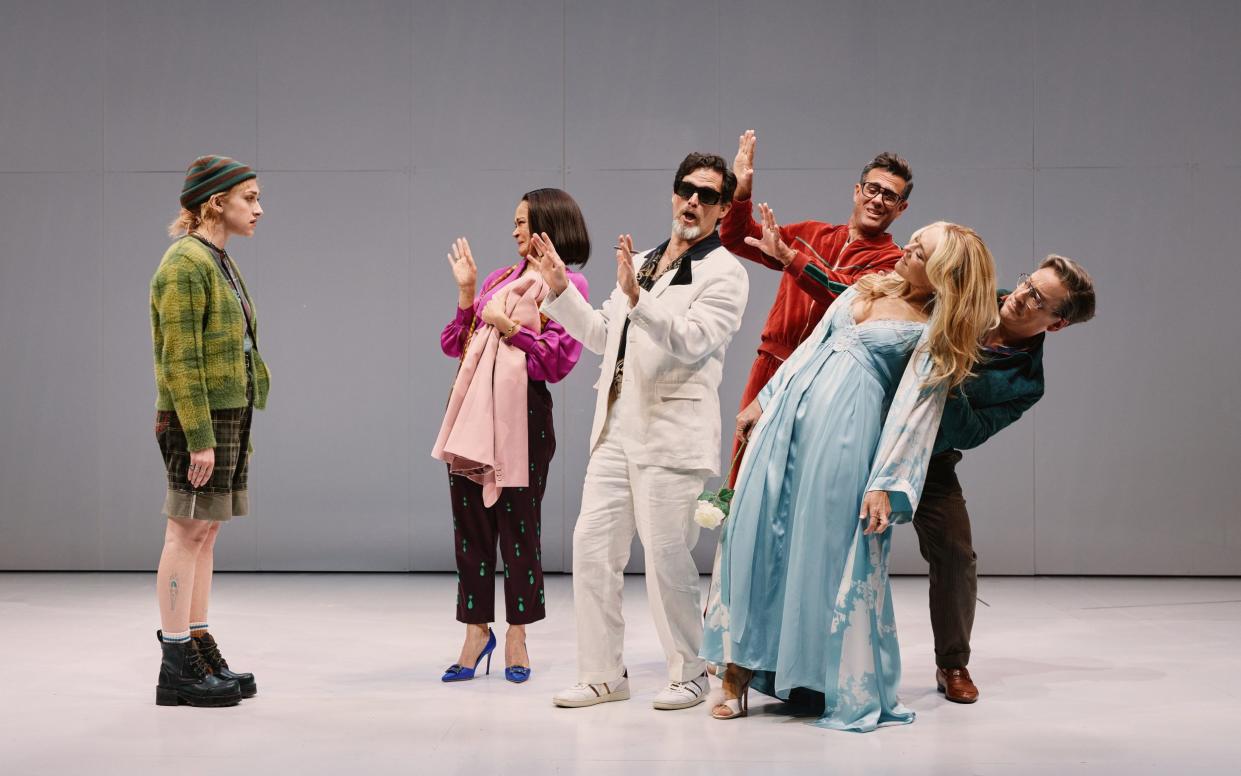Here We Are: Sondheim’s swansong is clever and ambitious – but not a crowd-pleaser

The world premiere of Stephen Sondheim’s final musical isn’t a big Broadway venture. Wisely, Here We Are – an imperfect show but a touching requiem for the man who reinvented and reinvigorated musical theatre – has come to life in The Shed, a 550-seat Off Broadway space. It’s a venue well suited to this odd, adventurous tuner that Sondheim worked on before he died in 2021 at the age of 91, since it’s not a show likely to stimulate audiences who aren’t already devoted Sondheim-ites.
Sondheim worked on the venture with book writer David Ives for 10 years and, despite saying it wasn’t ready in the days before his death, he reportedly gave the show the go-ahead. Inspired by two gems from surrealist film director Luis Buñuel’s (1972’s The Discreet Charm of the Bourgeoisie and 1962’s The Exterminating Angel), the musical, set in America, begins with six wealthy, shallow people searching for a place to brunch: Leo (Bobby Cannavale), a hedge-fund honcho; his wife, Marianne (Rachel Bay Jones); her revolutionary younger sister Fritz (Micaela Diamond); and their friends, corrupt ambassador Raffael (Steven Pasquale), cosmetic surgeon Paul (Jeremy Shamos) and his wife, talent agent Claudia (Amber Gray).
As in the films, they’re continuously thwarted in their efforts to find something to eat, though here those struggles are condensed into a day. Along the way we meet a colorful cast of servers and servants, all played to grand comedic effect by Tracie Bennett and Denis O’Hare. The latter even delivers a delightful ditty about all of the beverages the restaurant has run out of.
After an enchanting first act, these same characters end up trapped in a room by some existential dread or invisible force. It’s a palpable metaphor for what we endured during the days of Covid lockdowns, but it fails to resonate, largely because the songs stop. Yes, Sondheim musicals are known for defying traditional expectations of the genre, and maybe the characters losing their singing voices, and thus their ability to hope and dream, symbolizes their despair during isolation. But watching them play charades and eat paper from novels to pass the time and stay alive isn’t a substantial enough substitute.
Still, even with a truncated score, it’s clear Sondheim’s wit did not desert him in his twilight years. He was still generating clever rhymes and twisting phrases with panache, as when Marianne summarizes her joy by singing “I don’t need to read between the lines. The lines are just fine.” The melodies call to mind Sunday in the Park With George’s rapturous score.
Director Joe Mantello’s mostly smooth production – in which characters emerge from the darkness with renewed expectations for their lives, even as shadows linger – benefits from a high-calibre cast of New York theater regulars, with especially notable performances from O’Hare, Bennett, Jones, Ha and Pierce.
A transfer to Broadway, where revivals of Merrily We Roll Along and Sweeney Todd are raking in big bucks, seems unlikely, nor would this show be the crowd-pleaser that Sondheim revue Old Friends is on the West End. But his fanbase could probably fill the Menier Chocolate Factory or Donmar Warehouse for a limited London run.
Mantello has described Here We Are as “the punctuation on an extraordinary career.” Sondheim may have ended his career with a full stop rather than an exclamation mark – but that doesn’t make his canon any less magnificent.
Until Jan 21. Tickets: theshed.org

 Yahoo News
Yahoo News 
